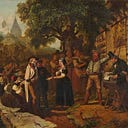Member-only story
How the Concept of ‘FETO’ Corrupts Minds of Turkey’s Opposition
Even the brutal crushing of the Movement by the government has not ended the opposition’s paranoia over its (non-existent) presence in Turkey.

When Muyesser Yildiz, a journalist working for ultra-nationalist secular media outlet OdaTV, was remanded behind bars over a fallout with the Erdogan government, she denounced the arrest as a FETO operation. Months before her detention, two other journalists with the same platform decried a FETO mindset behind their imprisonment over a report documenting Turkey’s shipment of weapons to Libya through cargo ships.
The FETO refers to the Gulen Movement in Turkey’s official political lexicon. The pejorative term often generates a negative connotation firmly rejected by the sympathizers of the reclusive U.S.-based cleric who has been declared by the Turkish state as the number one public enemy. In May 2016, two months before Turkey’s enigmatic and bloody coup, the National Security Council (MGK) designated the Movement as a terrorist organization (although it had no legal authority whatsoever to do that).
The abortive coup of July 2016 unleashed a sweeping purge by President Erdogan who hailed the coup as a gift from God. His crushing of the entire movement and selective targeting of opponents of the different political creed was based on a very useful label attached to the post-coup purge. In this fear-driven context, the FETO has emerged as a blanket definition to define anyone with the slightest hint of affiliation with the Movement. In reality, any dissident would fall under the category after crossing the path of the president and his ruling party. As such, people, publicly known as critics of the Movement in prior to its fallout with Erdogan, failed to escape that label when prosecutors sought to prosecute them over the charges of FETO membership.
Emin Colasan, one of the staunch Kemalists of the country and a columnist for Sozcu, was one of the journalists who got his share of these FETO prosecutions. Countless other people, whose credentials were well established as public faces of liberal, left and Kemalist intelligentsia, faced similar probes. This indiscriminate scope of FETO trials taints the…
